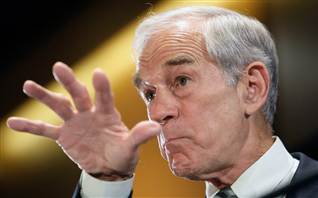Ron Paul Rails Against Adelson Online Poker Ban Plan
Posted on: November 18, 2014, 05:29h.
Last updated on: November 18, 2014, 05:31h.

Ron Paul has used his weekly column for the Ron Paul Institute to argue against an Internet gambling ban, saying that such legislation would curtail the freedom of Americans and would be taken up only for the benefit of casino owner Sheldon Adelson.
The former Republican Representative from Texas called such legislation an example of “cronyism,” something he says that most Americans are against regardless of their political ideologies.
“For example, Congress may soon vote on legislation outlawing Internet gambling,” Paul wrote.
“It is an open secret, at least inside the Beltway, that this legislation is being considered as a favor to billionaire casino owner, Sheldon Adelson. Mr. Adelson, who is perhaps best known for using his enormous wealth to advance a pro-war foreign policy, is now using his political influence to turn his online competitors into criminals.”
Gambling Ban Introduced to Congress in March
Paul’s words refer to the Restoration of America’s Wire Act (RAWA), a bill that was introduced by Republicans in both houses of Congress in March, and has since picked up small but notable amounts of bipartisan support in both the House of Representatives and the Senate. The bill would outlaw most forms of online gambling at the federal level, essentially changing the wording of the Wire Act to explicitly ban casino games and poker rather than just sports betting, as it is currently interpreted.
Paul spent much of his column dissecting and rejecting the various reasons given for supporting the ban in an attempt to show that it was really only being considered for the sake of Adelson.
“Supporters of an Internet gambling ban publicly deny they are motivated by a desire to curry favor with a wealthy donor,” Paul wrote. “Instead, they give a number of high-minded reasons for wanting to ban this activity. Some claim that legalizing online gambling will enrich criminals and even terrorists! But criminalizing online casinos will not eliminate the demand for online casinos. Instead, passage of this legislation will likely guarantee that the online gambling market is controlled by criminals.”
Paul Criticizes States’ Rights Argument
One of the major (and to many, perplexing) arguments used by supporters of RAWA is that such a ban would actually protect states’ rights. Paul explained their argument before laying out his reasoning for why it was faulty.
“Their argument is that citizens of states that ban Internet gambling may easily get around those laws by accessing online casinos operating in states where online gambling is legalized,” Paul stated. “Even if the argument had merit that allowing states to legalize online gambling undermines laws in other states, it would not justify federal legislation on the issue…arguing that ‘states rights’ justifies creating new federal crimes turns the Tenth Amendment, which was intended to limit federal power, on its head.”
Paul laid out several more arguments against the legislation before summarizing his opposition to an online gambling ban.
“The proposed ban on Internet gambling is a blatantly unconstitutional infringement on our liberties that will likely expand the surveillance state,” he concluded. “Worst of all, it is all being done for the benefit of one powerful billionaire.”
RAWA is unlikely to receive a hearing or see much movement in Congress during the current lame duck session. However, its prospects could improve in the next Congress, when Republicans will have majorities in both the House and Senate.
No comments yet